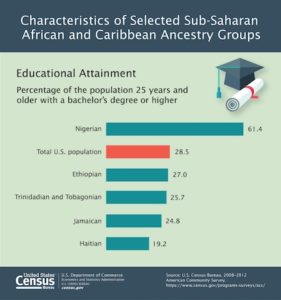 A new report from the U.S. Census Bureau examines the economic, social, and educational status of people of Nigerian, Ethiopian, Haitian, Jamaican, and Trinidadian and Tobagonian descent who are living in the United States. In 2012, there were roughly 2.5 million people living in the United States who reported ancestry from these areas. At least 59 percent of people from each group were foreign-born in 2012.
A new report from the U.S. Census Bureau examines the economic, social, and educational status of people of Nigerian, Ethiopian, Haitian, Jamaican, and Trinidadian and Tobagonian descent who are living in the United States. In 2012, there were roughly 2.5 million people living in the United States who reported ancestry from these areas. At least 59 percent of people from each group were foreign-born in 2012.
Perhaps the most interesting statistic in the report is that more than 61 percent of all people living in the United States with Nigerian ancestry who are 25 or older have at least a bachelor’s degree. This compares to 28.5 percent of the entire U.S. population. Except for Haiti, the other Black immigrant groups have higher levels of educational attainment than African Americans.

All of the immigrant groups featured in the report have a higher rate of labor force participation than Americans generally. Only those with Nigerian ancestry have higher median earnings than the U.S. population as a whole. All of these groups have lower levels of home ownership than Americans as a whole.
The full report, Characteristics of Selected Sub-Saharan African and Caribbean Ancestry Groups in the United States: 2008-2012, may be downloaded by clicking here.











